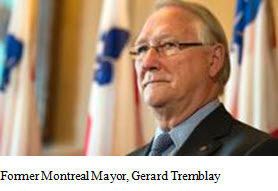Integrity
This is the second in a series of newsletters that explore the following four lines:
Sufficiency leads to integrity.
Integrity leads to responsibility.
Responsibility leads to right relationship.
Right relationship leads to sufficiency.
(Click here for Part One: Sufficiency)
Integrity
Everyone in Canada, living outside of Toronto, loves a good Toronto story. It's the city that unites the country faster than a gold medal in Olympic hockey through a sense of shared loathing. (American friends: think L.A. but for different reasons.) Toronto has a reputation as a chardonnay-swilling, left-leaning, CBC-loving, bicycle-riding, effete community of snobs. Me, I just call it home.
Back in the late nineties, when former Mayor Mel Lastman called in the army to dig Toronto out of a snowstorm, our Montreal relatives would phone us up and laugh and laugh. No snowstorm ever stopped a Quebecer, they'd exclaim! My relatives still love to laugh and laugh at Torontonians, as though the army was permanently stationed here, digging.
I know. They're annoying.
Recently, we thought the tables were turning after a construction-bid corruption scandal brought down Montreal Mayor Gerard Tremblay and a succession of other Quebec politicians. Proof of what everyone knows — Quebec politics has been infiltrated by organized crime. Heck, most people think politics is organized crime.
Just as I was picking up the phone to call the family and bellow my best "moo-haw-haw," Rob Ford, the current Mayor of Toronto, went and fumbled the ball. Ford violated conflict-of-interest rules. He's being ousted for "misusing city resources to fund his personal football charity." It was a nickel and dime affair, but none-the-less, he was convicted. He's appealing the verdict.
The harassment calls from Montreal are starting up again. I'm disconnecting my phone.
Gaps and Lapses
"There is no time so miserable but a man may be true."
— William Shakespeare
Jokes aside, integrity gaps and lapses abound in public and private life. Conflict of interest, bribes, sexual misconduct, abuse of power, profligate spending, cheating and other forms of corruption are bringing down leaders like flies.
Recently, I had a business executive question the amount of time and focus I place on integrity and the development of character as a solid foundation for leadership. "What's that got to do with leadership," he asked? "Isn't that just about being a good person?" That this executive is working in the financial services industry is more proof that many in the business community just don't get it. Why is there so little recognition that the right use of power — a fundamental responsibility of leaders — is directly tied to integrity?
Most of the economic calamities of the past few years are outcomes of a deficit of character and the failure of many leaders to abide by the basic, moral values that guide good governance. You would think that with the dizzying array of business failures, arrests, government interventions and negative press about the state of the world economy and those that lead it, these smart people would reach the same conclusion. We are not simply having an economic crisis. This is an integrity crisis.
With great talent and power comes great responsibility. Talent and power must be subject to morals, values and principles. Without these as ballast, leaders behave like despots who stand above the rule of law. Yet, we have tolerated the excesses of those who are most talented, seduced by a "star player" mentality that runs the gamut from petty tyrants and bullies in the office, to grandmaster Ponzi schemers looting billions from trusting investors.
Winning at any cost may be the highest value in Western society today. If this is true, the ways of honor and integrity are endangered. But so to is free enterprise, which is an integrity-based economic system. If we lose our faith in the integrity of global markets, free-market capitalism will collapse and we will be thrust backwards into heavily regulated, protectionist economies.
If the absence of integrity is the problem, then its recovery and promotion are keys to addressing good governance. Integrity is earned and maintained by the quality of leadership that we demonstrate. Ethical, principled and thoughtful leaders are required to restore trust in our social systems. The United States Military Academy holds as its motto: "The cadet will not lie, cheat or steal, nor tolerate those that do." A good policy.
We may not all have lied, cheated or stolen the property of others. But we may have been too tolerant of falling standards and practices of integrity.
The Twelve Trusts
The Cadet's code of conduct led me to do some research. I found the following material at a wonderful website called Chivalry Now (www.chivalrynow.net/). I think it provides an excellent set of principles and practices by which leaders can behave their way to greater trust through personal integrity.
"Upon my honor,
- I will develop my life for the greater good.
- I will place character above riches, and concern for others above personal wealth.
- I will never boast, but cherish humility instead.
- I will speak the truth at all times, and forever keep my word.
- I will defend those who cannot defend themselves.
- I will honor and respect women/men, and refute sexism in all its guises.
- I will uphold justice by being fair to all.
- I will be faithful in love and loyal in friendship.
- I will abhor scandals and gossip–neither partake nor delight in them.
- I will be generous to the poor and to those who need help.
- I will forgive when asked, that my own mistakes will be forgiven.
- I will live my life with courtesy and honor from this day forward."
The Twelve Trusts are one way that we can support ethical conduct and restored trust in leaders. It is also an excellent teaching tool for young people. What if we took this oath every morning?
I think the world would be a better, more moral, place.


